Sony VAIO Pro 13: Exceptionally Portable
by Jarred Walton on October 16, 2013 12:00 AM ESTSony VAIO Pro 13: Performance
In most areas, the performance of the VAIO Pro 13 is more than sufficient. Loading up Windows and common applications, surfing the web, and even video encoding (especially with an application that supports Quick Sync) are all plenty fast. There are faster laptops out there, certainly, but they don't have anywhere near this level of portability. Here's our standard selection of performance metrics, and you can see that the VAIO Pro 13 is basically in line with other Ultrabooks. Note that most of the other Ultrabooks have used Core i7 ULV processors, so here the VAIO Pro 13 is at a disadvantage. The cores specs for the tested laptops are listed in the table below, and additional benchmark results are available in Mobile Bench.
| Overview of Laptops in Charts | ||||||
| Laptop | CPU | GPU | Storage | RAM | LCD | Battery |
| Acer R7-571-6858 | Intel Core i5-3317U | HD 4000 | 500GB HDD + 24GB SSD | 1x4GB + 1x2GB | 15.6” 1080p Glossy AHVA Touchscreen | 4-cell 54Wh |
| Acer S7-391-9886 | Intel Core i7-3517U | HD 4000 | 2x128GB RAID 0 SSDs | 2x2GB | 13.3” 1080p Glossy AHVA Touchscreen | 4-cell 35Wh |
| Acer V7-482PG-9884 | Intel Core i7-4500U | GT750M DDR3 / HD 4400 | 1TB HDD + 24GB SSD | 1x4GB + 1x8GB | 14” 1080p Glossy AHVA Touchscreen | 4-cell 54Wh |
| AMD Kabini Prototype | AMD A4-5000 | HD 8330 | 256GB SSD | 1x4GB | 14” 1080p Matte IPS | 6-cell 45Wh |
| Apple MacBook Air 13 (2013) | Intel Core i5-4250U | HD 5000 | 128GB PCIe SSD | 2x2GB | 13.3” 1440x900 Glossy TN | 4-cell 54Wh |
| Dell XPS 12 | Intel Core i7-3517U | HD 4000 | 256GB SSD | 2x4GB | 13.3” 1080p Glossy IPS Touchscreen | 4-cell 47Wh |
| Dell XPS 13 | Intel Core i5-3337U | HD 4000 | 256GB SSD | 2x4GB | 13.3” 1080p Glossy IPS | 6-cell 47Wh |
| Sony VAIO Pro 13 | Intel Core i5-4200U | HD 4400 | 128GB PCIe SSD | 2x2GB | 13.3” 1080p Glossy IPS Touchscreen | 3-cell 37Wh |
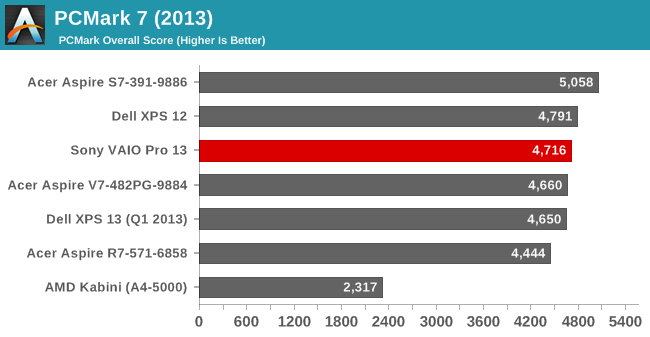
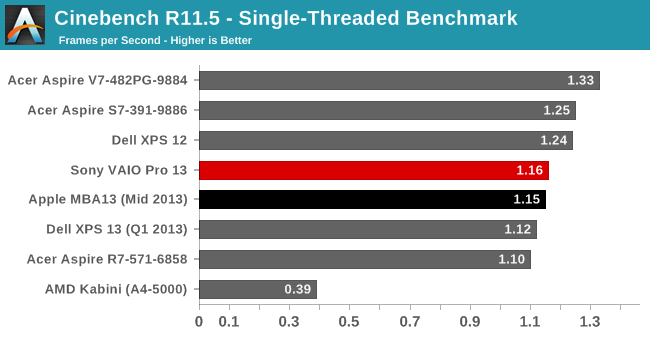
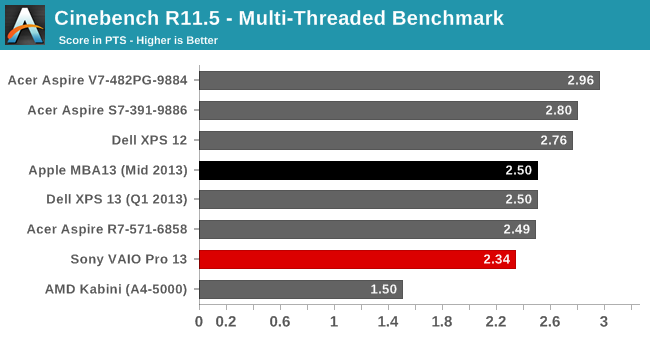
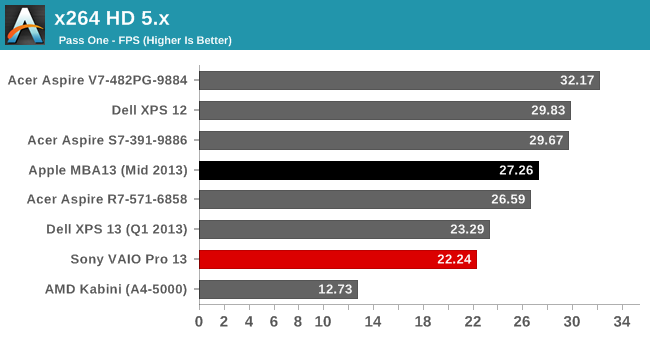
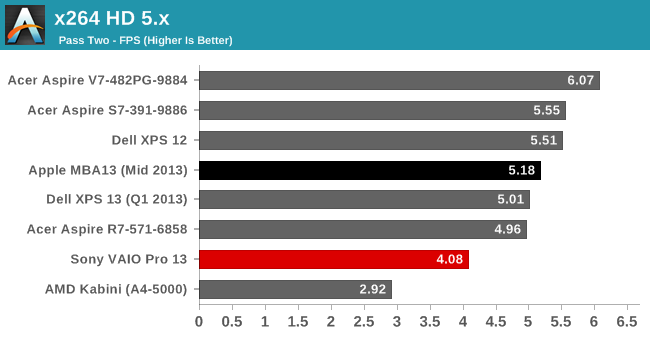
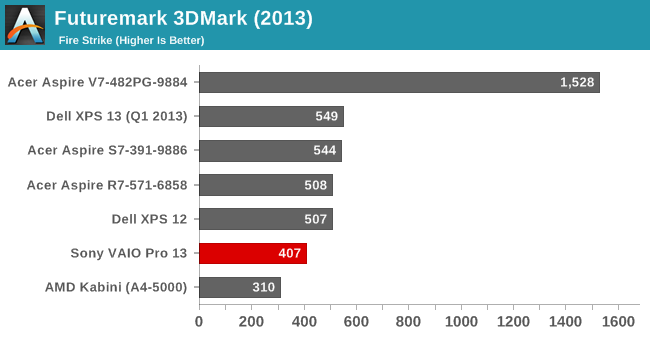
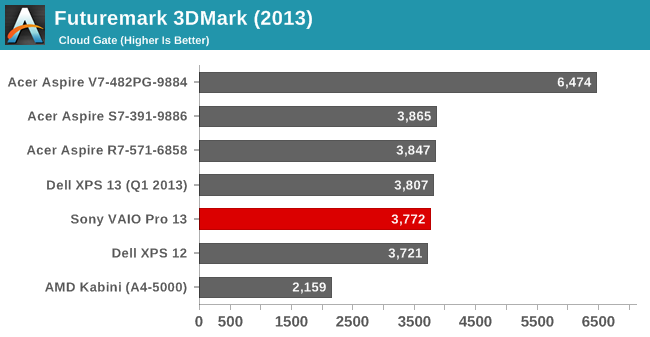
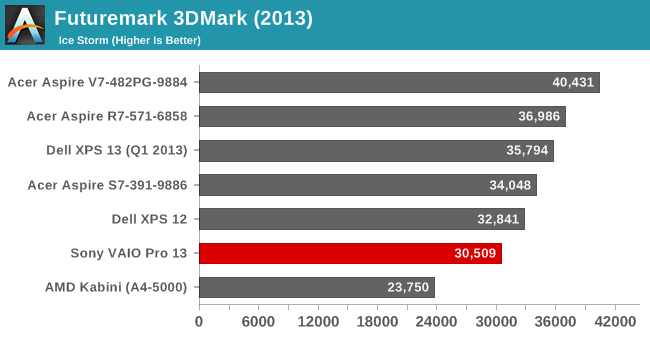
In our general performance graphs, here we get another results showing that Haswell isn't really any faster than Ivy Bridge in most tests (unless it has a GT3/GT3e iGPU, or in specific tests that leverage the new instructions). Move to the 3DMark results and the VAIO Pro 13 doesn't really look so hot. It's now clearly slower than the Core i7 Ivy Bridge Ultrabooks, which isn't something I'd expect from 20 EUs. Either Intel actually has slower EUs in Haswell than in Ivy Bridge, or Sony is curbing performance of the iGPU to keep within their desired thermal range. Our gaming results continue this trend:
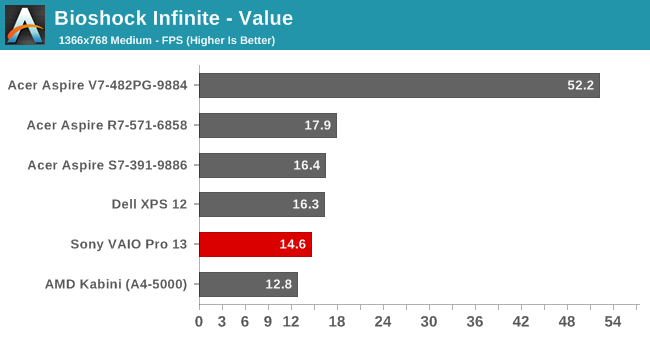
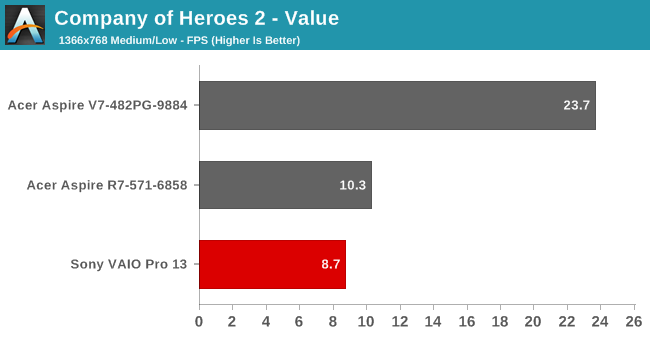
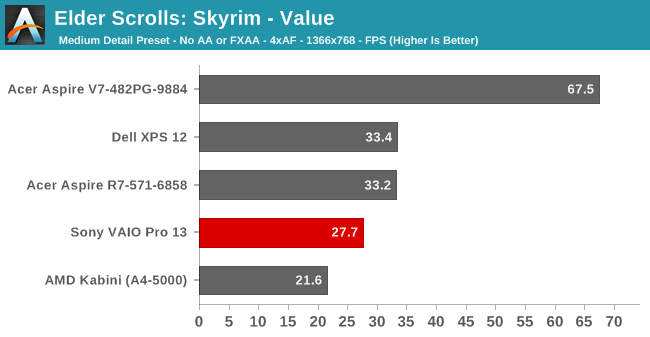
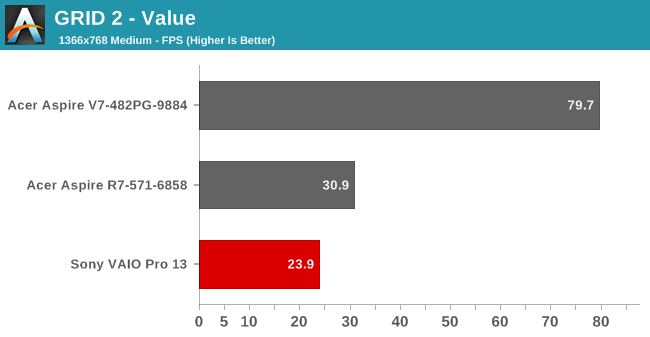
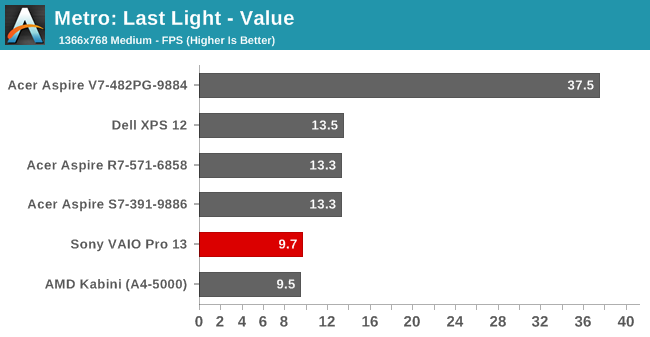
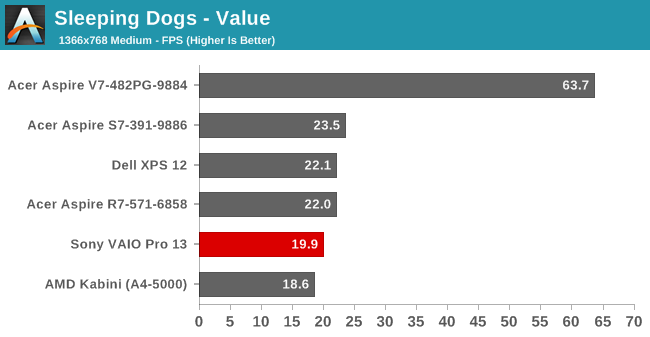
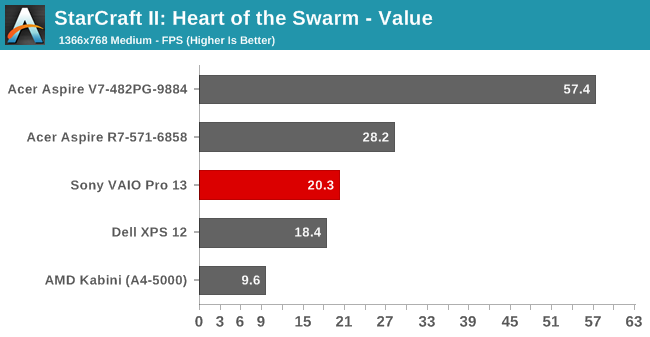
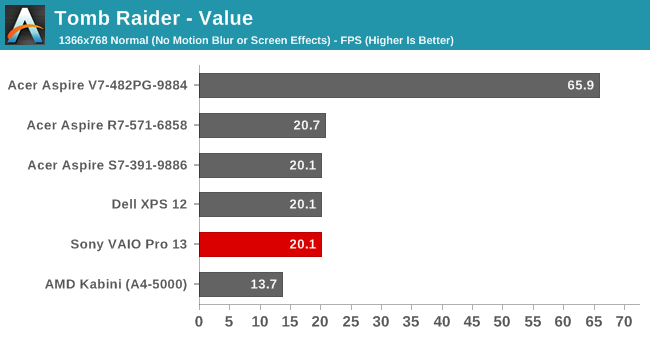
Other than in StarCraft II: Heart of the Swarm and Tomb Raider, the VAIO Pro 13 ends up being slower than every other Intel Ultrabook that we've tested. The Acer V7 isn't technically an Ultrabook, though it's close enough in many respects, but we can see just how much even a moderate dGPU adds in terms of performance. We also have some results for Crystalwell (i7-4750HQ) in Mobile Bench that we're not including here, and GT3e is much faster as well (though the Clevo W740SU doesn't do all that well in the battery life department). Perhaps GT3 would help the VAIO Pro 13, but several games seemed to have issues maintaining higher iGPU clocks – Metro for instance showed cyclic higher/lower performance during the benchmark runs. It's mostly a moot point, though, as outside of light gaming the HD 4400 simply isn't fast enough to handle a lot of games.










106 Comments
View All Comments
JarredWalton - Wednesday, October 16, 2013 - link
I don't know about the Tri-luminos tech confusing my colorimeter, but I have verified on a couple laptops that the calibration just looks really off, so I've held off doing any more potentially flawed testing.As for build quality, I noted that it's by design, but I disagree with the design. Yes, it should hold up reasonably well, but laptops like the ASUS U-series, MacBook Air, heck even the Acer S7 all feel better (though the keyboard on the Acer is not at all good in my book). It's a sacrifice of rigidity in favor of being ultra lightweight, and that's fine -- I can live with it and not complain too much. Still, I wish Sony would reinforce the chassis just a bit more. Carbon fiber is not at all heavy, so another layer or two bonded on there would do wonders.
SSD performance is good, and really maximum transfer rates start to become meaningless past a certain point. I would rather have a somewhat slower 256GB SSD than a faster 128GB SSD, simply because I need more capacity. But the VAIO Pro 13 does boot and load programs very fast (other than Windows 8 Apps, which as usual take far too long to load).
teiglin - Wednesday, October 16, 2013 - link
My 256GB unit has a Samsung, and I got 1GB/s sequential read and 825MB/s sequential write just now, if you're curious. Is the Toshiba worse?As for the build quality, I didn't think Jarred was too harsh on it--he mentioned that he liked a more "solid" feel as a matter of preference and not that there's anything inherently wrong with the flexible chassis. I can get a noticeable amount of flex even when mine is closed though, if I squeeze it--again not problematic necessarily, but I can understand if people would like a more rigid design better. Obviously increasing rigidity isn't going to keep the laptop at 2.3lbs.
juhatus - Wednesday, October 16, 2013 - link
When I was ordering, I picked the free 256gb option. I just checked the sony webstore again and now they are offering msata and pci-e options for SSD atleast in Europe. (256gb pci-e upgrade is free btw).I remember the Toshiba being very similar to 840pro speeds, maybe its the msata version. But anyhow its plenty fast. SSD is just something that people should make note because there are alot of different versions Sony ship with these.
SetiroN - Wednesday, October 16, 2013 - link
You really need to re-think your benchmark suite.Who gives a crap about how far an ultraportable goes below 20fps in games.
We need to know how its SSD performs, how long it takes to elaborate files, zip them, copy them. How fast network transfers are. REAL WORLD USE, not freakin' cinebench.
JarredWalton - Wednesday, October 16, 2013 - link
The PCMark scores more or less encapsulate all of the data points you're after. I noted that the SSD is quite fast, and has very good boot times. The CPU results are there just as reference points, and the gaming tests are there to show that, no, this is not a gaming laptop. You'll notice how much time I spent discussing the benchmarks, and that's because for the most part the benchmarks (outside of battery life) simply aren't important. It's more than fast enough. If you have to know how much faster it is than other laptops, you're probably going to want something with a quad-core CPU and a dGPU. Ultrabooks for the most part target the mainstream user that values mobility over performance, so that's the focus of the review.piroroadkill - Wednesday, October 16, 2013 - link
ASUS UX301: with the desired i7-4558U (which is also what I'm interested in) is available in Germany.http://www.amazon.de/Zenbook-UX301LA-Ultrabook-Int...
Since it's publicly available, there's no NDA. I say buy one from Germany and get it shipped. You know people want an indepth review on it.
piroroadkill - Wednesday, October 16, 2013 - link
Also, I mean the i7-4558U is what I'm interested in. The Asus Zenbook Infinity (UX301) does look good, too. I'd love to see it released properly so I could play with the available configurations.However, pretty much any laptop with this CPU that is 13" is worth reviewing.
JarredWalton - Wednesday, October 16, 2013 - link
Now if only I had the money to buy things and have them shipped to me for review....Fatality - Wednesday, October 16, 2013 - link
Great review, But where is the mention of bloatware? Does this thing come with lots of it? I ask this because specs and presence of Bloatware are the primary factors I base my buying decision on. I know a lot of people who do that as well. Has Bloatware? no buy.juhatus - Wednesday, October 16, 2013 - link
I think win8 has generally reduced bloat, but on this vaio pro 13 Sony has put few modern app's and mcafee virus protection (witch i instantly uninstalled and went with win8 defender) Also i think there was the office365 trial included, have not even started that. But id say very little bloat.